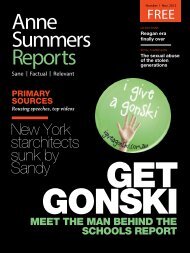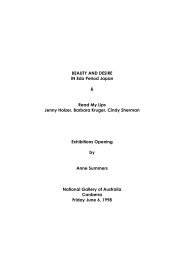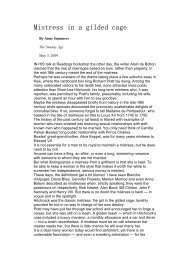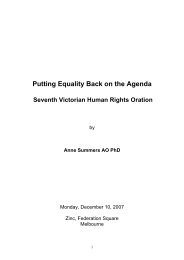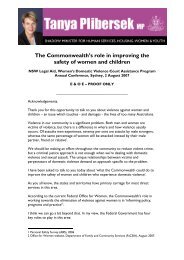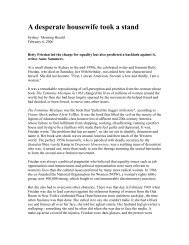Read article.
Read article.
Read article.
Create successful ePaper yourself
Turn your PDF publications into a flip-book with our unique Google optimized e-Paper software.
Plibersek was elected to Federal Parliament on October 3, 1998, along with 15 other women<br />
including Julia Gillard, Nicola Roxon, Anna Burke, Cheryl Kernot (as a Labor MP) and, on the<br />
Liberal side, Julie Bishop. Fourteen years later, despite the encroachment of the Greens into<br />
inner-city politics and a rising Liberal vote due to wealthy people settling in places like<br />
Balmain, Sydney is still safe for Plibersek. In the 2010 federal election, she won 67.07 per<br />
cent of the vote after preferences were distributed. She is so popular in Sydney that,<br />
according to a colleague, people who are not party members work for her on election day.<br />
"The seat is absolutely safe as long as she's the member," says a federal colleague.<br />
Since 2007, Plibersek has held the non-cabinet portfolios of Housing, Status of Women,<br />
Social Inclusion and Human Services. In December last year, she was elevated to cabinet.<br />
She asked for the $51.1 billion Health portfolio, she says, because "if we get it right we can<br />
literally improve the lives of millions of people".<br />
As a junior minister, she pulled off two impressive feats - the $1.1-billion National<br />
Partnership Agreement on Homelessness, and the $44.5- million National Plan to Reduce<br />
Violence Against Women and Their Children. The homelessness approach is "more<br />
sophisticated and more ambitious than you would see around the world", says Tony<br />
Nicholson, executive director of the not-for-profit organisation Brotherhood of St Laurence,<br />
which works with disadvantaged people.<br />
"There was a lot of emphasis on housing people permanently, not just transitioning them<br />
through temporary housing," Plibersek explains. "It went hand in hand with investment we<br />
did in 21,000 affordable housing units, because you can't fix homelessness if you don't fix<br />
affordable housing."<br />
Karen Willis, director of the NSW Rape Crisis Centre, which under the National Plan to<br />
Reduce Violence received funding of $12.4 million to take over the national crisis telephone<br />
counselling line previously managed by Lifeline, says they were "devastated" when Plibersek<br />
left the portfolio. "Tanya was marvellous," says Willis. "She had a good understanding not<br />
just of the horrors of violence, but of the causes and the impacts; she understands trauma<br />
and the need to have highly qualified counsellors."<br />
In her first few months in health, Plibersek presided over an expansion of the National<br />
Bowel Cancer Screening Program and included boys in the Gardasil immunisation program,<br />
and it was she who got Labor's long-standing policy of means-testing the private health fund<br />
rebate through Parliament. The problem with the immense, complicated and fast-growing<br />
health system is that its structural components tend to reduce the capacity for creative<br />
change. And the rapidly approaching tsunami of ageing baby boomers will put pressure on<br />
the universal health system. "Tanya knows this," says a colleague, who says she is totally<br />
committed to maintaining universality.<br />
Will Plibersek have scope in Health for really big reform? The consensus among bureaucrats<br />
I spoke to was: no. "There's no money and no time," says one. So it was quite stunning<br />
when, at a hurriedly convened press conference at the Sydney Dental Hospital on August 29,<br />
Plibersek announced that two days earlier, cabinet had approved a $4.1-billion meanstested<br />
dental care program for children and low-income adults. "We'll have a generation of



